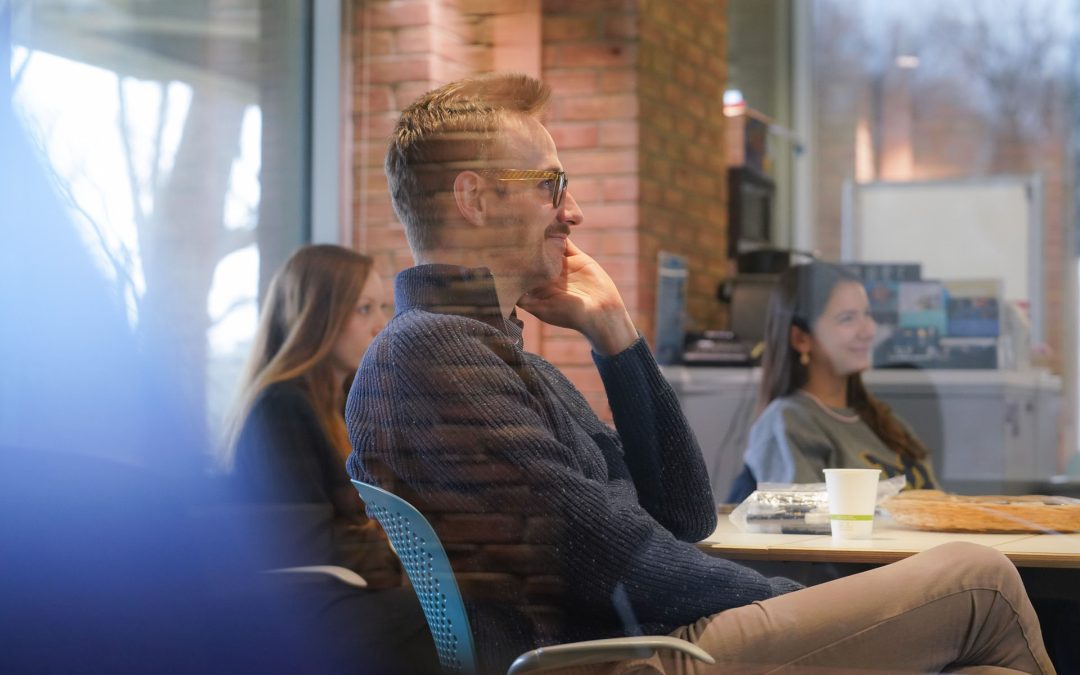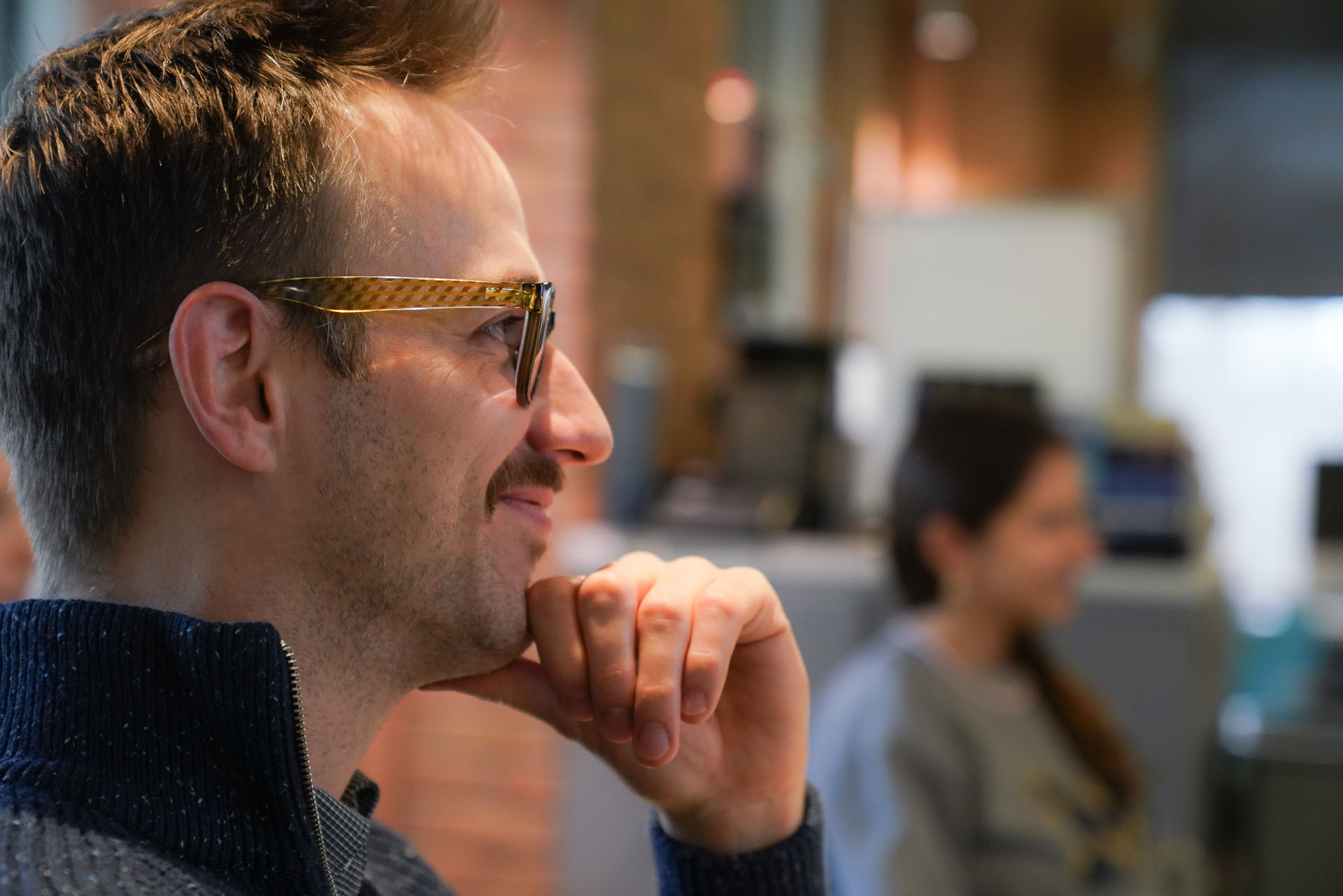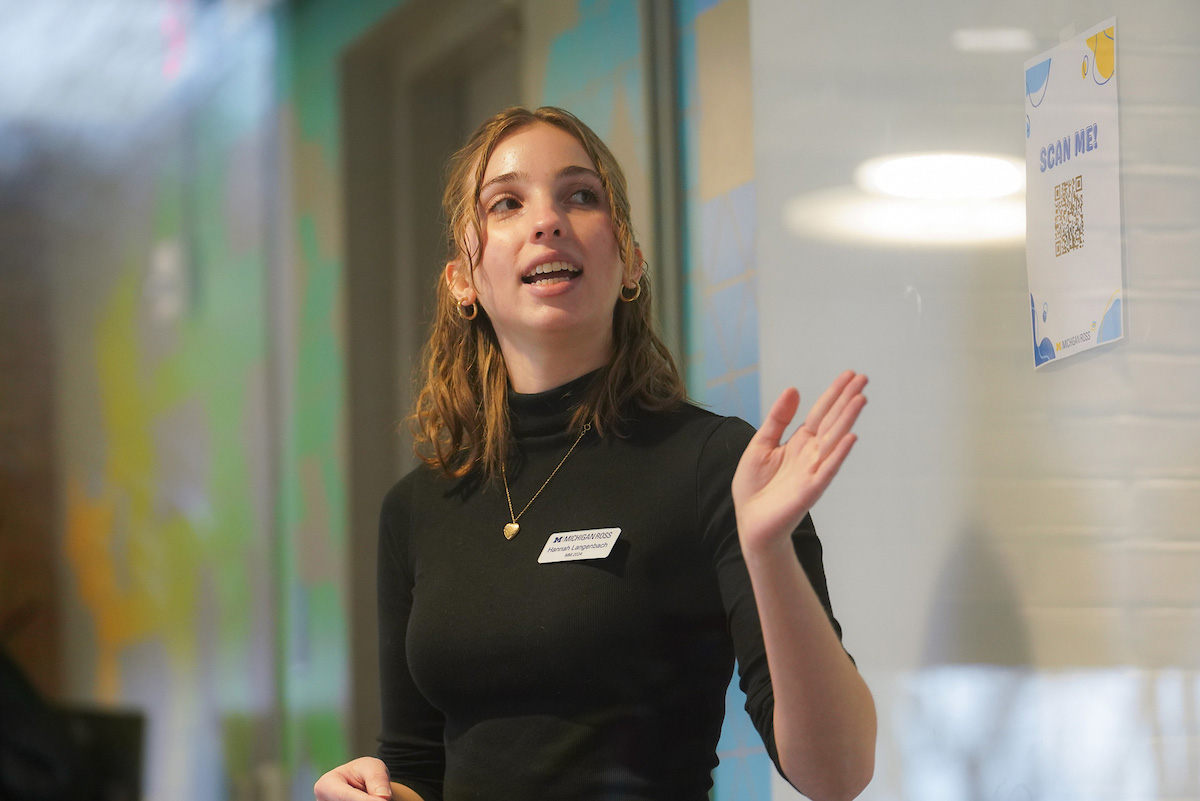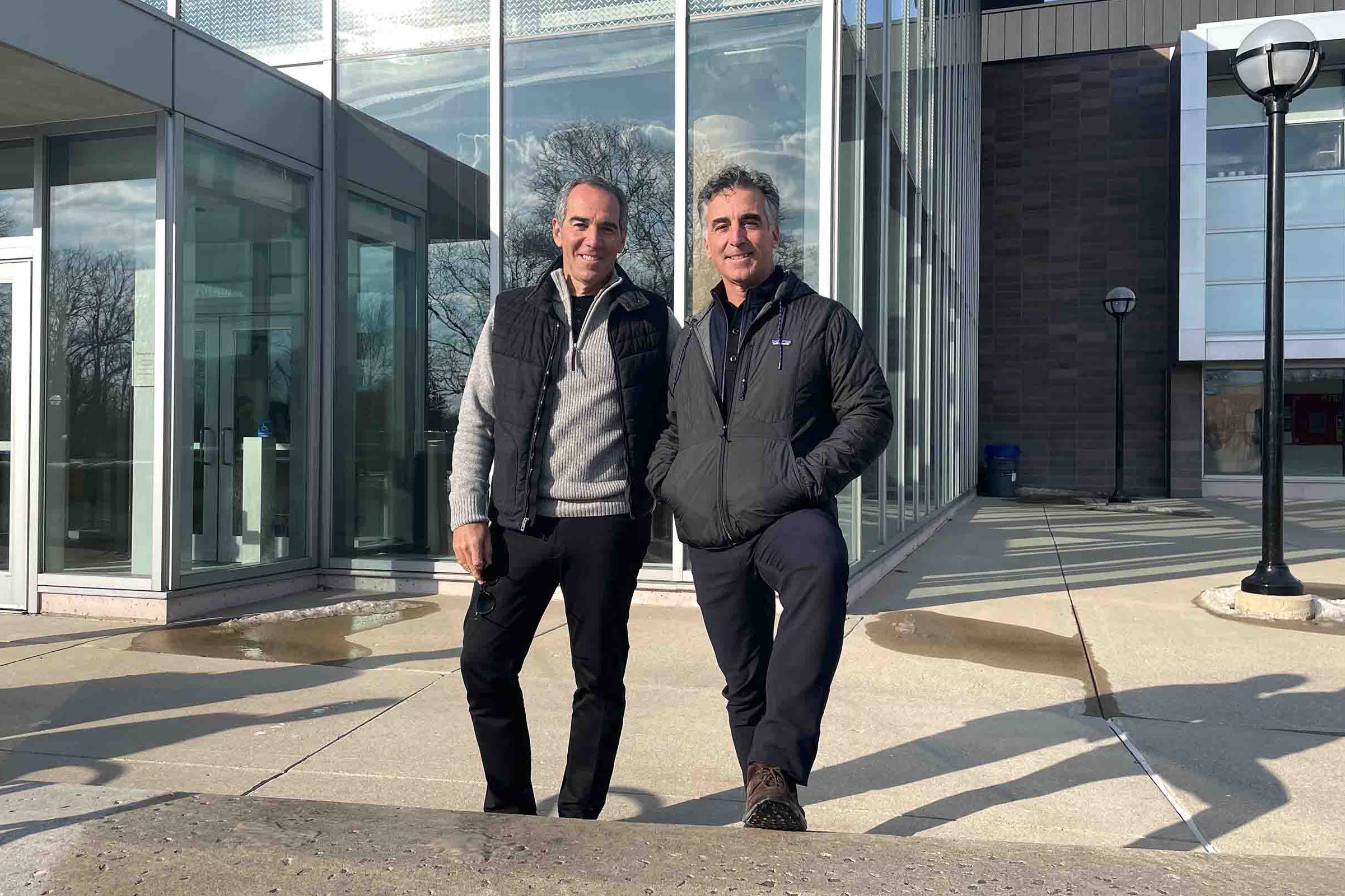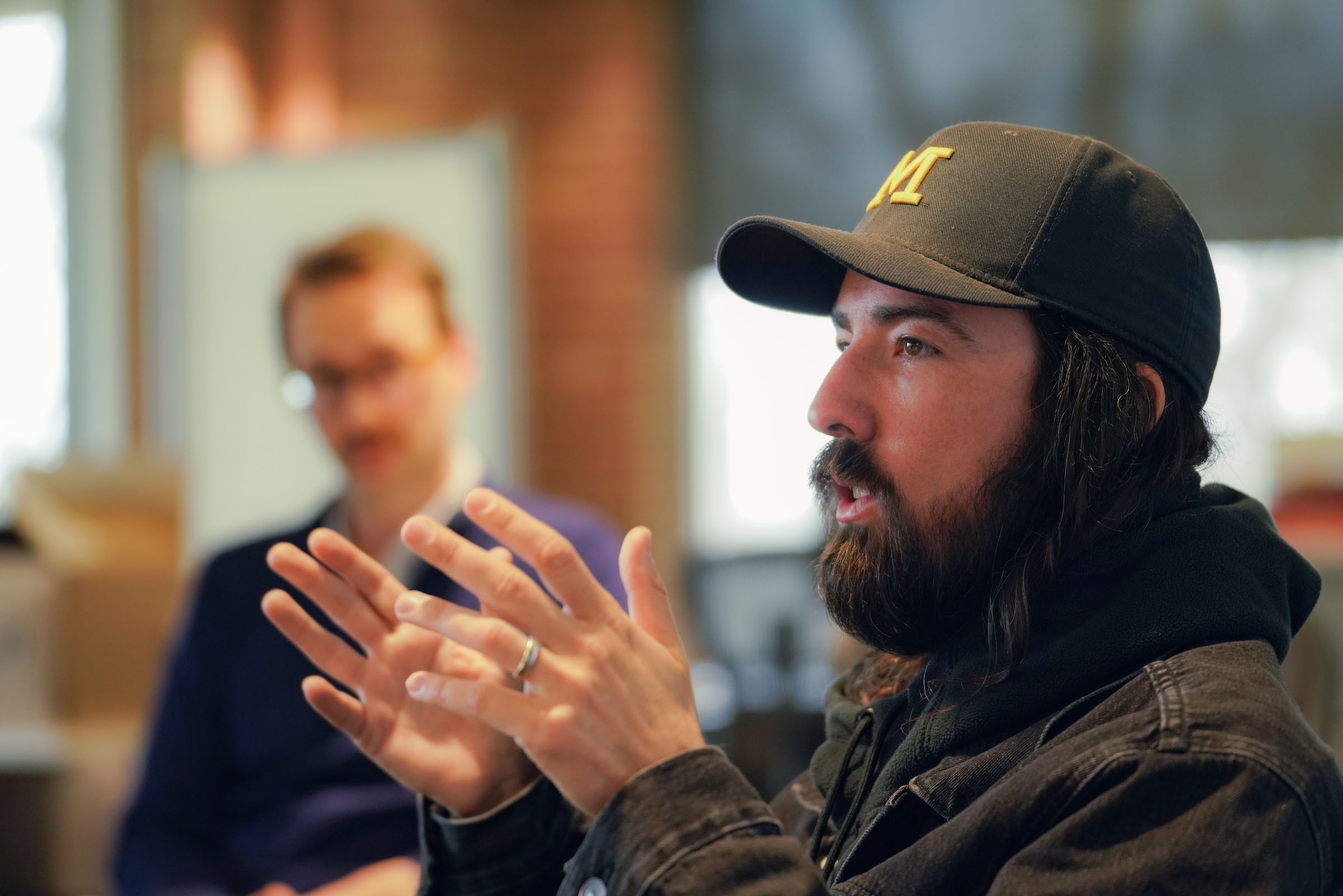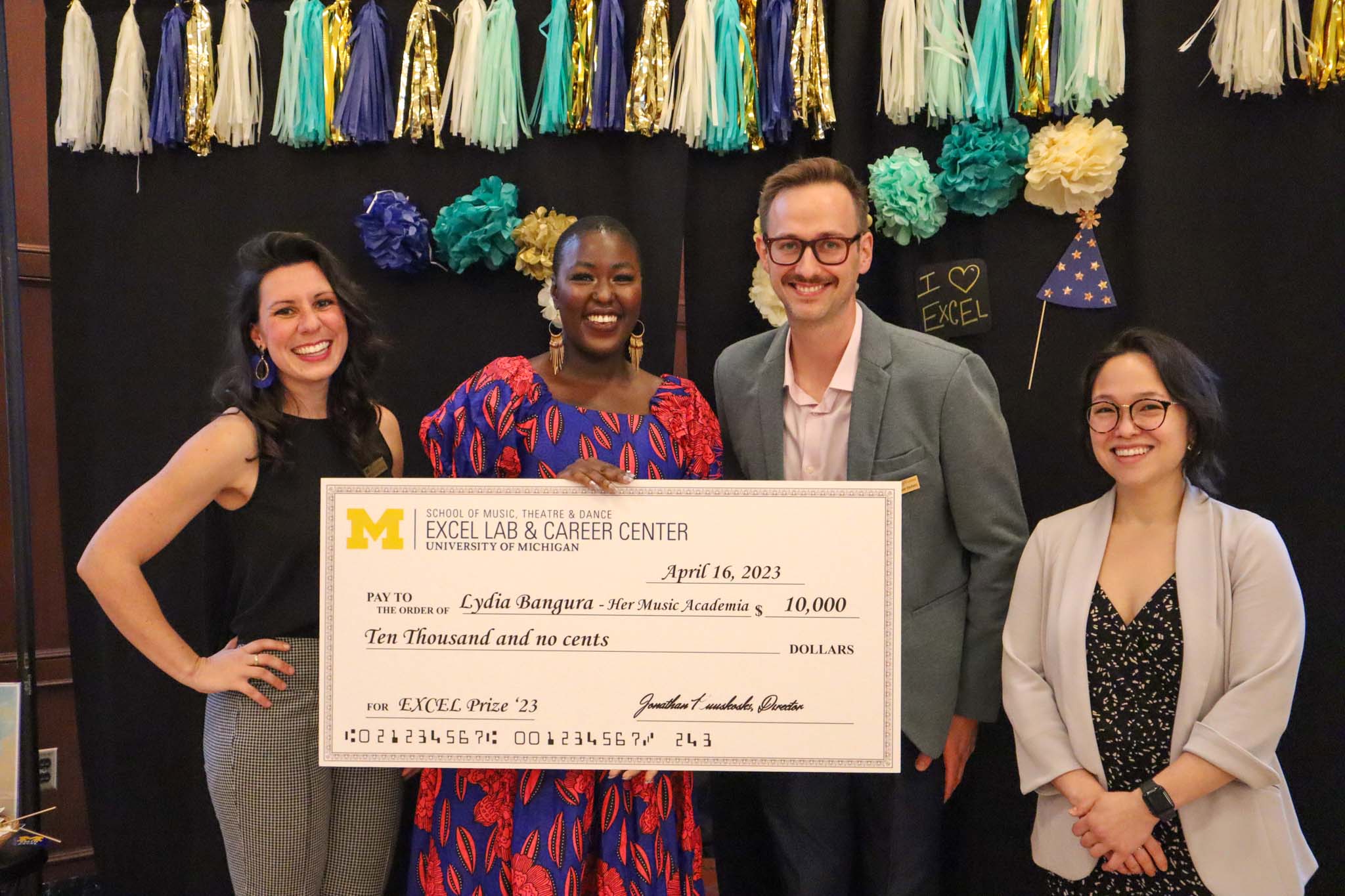Michigan Muse Winter 2024 > EXCEL Lab: An Interview with Jonathan Kuuskoski
Bringing Ideas to Life at the EXCEL Lab: An Interview with Jonathan Kuuskoski
The EXCEL Lab, which launched in 2015 thanks to a generous gift from the Weiser family, is SMTD’s center for entrepreneurship, leadership, management, and professional development resources. Embedded within the Department of Entrepreneurship & Leadership, EXCEL provides an array of valuable resources for SMTD students, helping them plan for the post-graduation job search and connecting them with arts internships and immersive experiences. EXCEL also goes well beyond traditional career services, offering customized coaching and mentorship and providing project and venture funding. In this interview, Jonathan Kuuskoski – director of the EXCEL Lab, assistant professor of music, and chair of the Department of Entrepreneurship & Leadership – explores EXCEL’s guiding principles and unparalleled resources.
One of the objectives of the EXCEL Lab is to help students launch and sustain a life in the arts. The “sustain” part is especially important – can you speak to the ways EXCEL helps students find a path that is sustainable?
Sustainability is a challenging concept. A lot of times we think sustainability means something has to exist in its current state, in the same way, forever, but there’s another way to think about it. Sustainability means getting from year one to year two, from year two to year three, and then at some point, you’ve built some momentum where you can really map out what the next few years are going to look like.
That’s how I think we need to approach the concept of sustainability. And that timeframe is important not just because it’s more realistic, it’s also because we know that it’s after that period of time when alums of our programs decide if they’re going to persevere with their original professional goals or pivot into something different. Building a career in the arts takes time.
I think we have to meet the students where they are, and for students who don’t have a clear sense yet of what they want to do, we have to support them in starting to imagine what that future looks like. The second step is helping them find the personalized, tailored resources that will help them make progress towards the next steps to take for a stronger position relative to those goals.
What are some of those resources that EXCEL helps students connect to, and how do you assess which resources are best for which students?
We purposely have a wide variety of resources available because we have dozens of variations of degree types in SMTD, and within each of those communities of students there’s a lot of divergence in terms of personal aspirations.
Many of the students who come to us could be loosely placed in one of three themed groups. We have the students that are coming to EXCEL who want to develop and sustain an artistic career – as a performer, composer, scholar, teacher, sound engineer, etc. They may have a clear vision for their dream career, but some are not dead set on one job yet; they want to assemble a tool kit to set them apart in a competitive field, and also as a sort of insulation against uncertainty. They likely want the ability to be resilient in the early years of their career, when finding the right opportunity may take some time. For those students, courses are really valuable. They may come in and say, I really want to learn about grant writing, and I’m going to take a specific course to go deep on that topic. These students often take courses in an a la carte way to assemble the practical skills they think are most useful to them.
For those students as well, if they want to create resiliency through their own self-started work, the best thing they can do is get experience building and realizing projects. So applying for funding from us to create their first small-scale project – whether that’s staging a show, taking a recital or program on tour for the first time, developing a research project, or anything that they can realize within a semester’s time or so – is a beneficial process. Not only is the funding that we have through the Enterprise Fund, which offers micro grants of up to $1,000 for individual or team projects, very accessible, we also have a whole spectrum of training resources, from self-study modules online, to one-on-one coaching, to events that focus on skill building. It’s not just about being successful in getting a thousand dollars, it’s learning how to tell a story about what they want to do, and it forces them to come up with a plan.
In the second category are students who, regardless of their degree, might be saying, I want to be prepared to be employed in an arts management, administration, or leadership role. Maybe they do want to pursue performance opportunities, as an example, but they are also thinking about securing a half-time or even a full-time job to support themselves and relocate to New York, Chicago, or LA, and then build their artistic profile on the side. For those students, coaching is helpful because it helps them prepare for interviews, optimize their resumes and cover letters, and find opportunities that might suit them. The students in that category often are taking a suite of courses to earn a credential, such as the Performing Arts Management and Entrepreneurship (PAME) minor. For many students, that path also involves an internship. Especially for students who are looking for employment in arts management or arts administration jobs, it’s a way to build their reputation within an arts organization and to broaden their professional contacts. EXCEL is able to provide funding to help offset costs associated with unfunded, or underfunded, internships to make those opportunities realistic regardless of a student’s personal financial means.
In the third category are students who might be described as multi-hyphenates. They don’t have an either-or idea about their careers. These are students who might be double majoring or might just have multiple artistic lives. For them, sustainability means also figuring out what their identity will be. And for those students, I think the most important thing is not only to help them imagine what they want their future to be, but to give them confidence that they don’t have to live in one box. It’s also a matter of connecting them with alums and other professionals who represent those kinds of lives, to help them find their community.
Coaching seems like a key part of EXCEL’s offerings.
Coaching is involved in almost every single appointment, and the coaching resources cut across all categories of EXCEL’s offerings. I think the coaching services are essential; they give students a private, safe environment to have a conversation about their individual circumstance, and to have somebody there to just listen to that.
We guide students to the unique combination of resources that are going to help them make progress over time – and to help them understand that it will take time. If they start thinking about this as a sophomore, they actually have lots of time to develop those skills, to spread out that learning and grow over time. We would never, in an artistic training context, expect people to go from point A to F overnight. It’s incremental knowledge that you build over time. No pianist comes in for their first piano lesson and plays a five-finger pattern and then next week the teacher says, “Great job, Avery. Next week, Mozart concerto!” We would never expect that. Professional development, like anything else, is a long-term, skill-building endeavor.
EXCEL’s mission also involves “expanding the professional development bandwidth” of an SMTD degree program. What is meant by that phrase?
Yeah, that’s really intentional language. It’s not like there’s a vacuum of professional development at this school, and we’re the only place that does it. Every program that a student’s enrolled in is going to have embedded within it professional development training. They’re going to learn not just the essential craft of their discipline, but also what it takes to develop a professional life. That’s the context of training at SMTD. Each student is going to get mentorship from faculty that is really going to help them, at a very high level, develop a professional trajectory. We think about ourselves as just adding bandwidth to that work.
What that means is that a lot of the work that we do in terms of other types of training or guest artists and so forth is always done in collaboration with the department. So instead of us saying, we think the school needs X, Y, and Z, we actually go to departments and say, What do you think is really essential? How can we help you help your students even more?
Sometimes that’s bringing in guests to conduct workshops or trainings for students. Sometimes it’s workshops that we deliver ourselves. One that I often do is personal financial management. We have a whole series of workshops that prepare students in a very practical way on topics like how to put together a budget and a savings plan, how to measure cash flow, how to consider pricing their own work and their time.
In 2022, the EXCEL Lab hosted Monte and Avery Lipman, founders of Republic Records, whose roster includes such superstars as Taylor Swift and Drake. Photo credit: Chris Boyes
A key phrase used to describe EXCEL’s practices is “turning ideas into action.” How does EXCEL support students in this way?
Every one of our programmatic offerings is in service of this goal. First, coaching is a space to help students build confidence, to empower them to claim their identities, and then also to give them tailored advice on developing a step-by-step action plan. Courses are also important, providing a more robust way of developing skills that they can apply immediately to projects they want to develop, and then, later, to their work as an employee.
Of course, when it comes down to it, you might have the idea, you might have the confidence, you might even have the plan. But you need the money. And that’s where the grants really help. To date, we have provided over $900,000 to students across all our funding programs. The Enterprise Fund alone has supported more than 400 student-led projects, from every corner of the school, with more than $400,000 in funding. And the demand level for grants through our Enterprise Fund has been consistent – even through the COVID-19 pandemic period, it never dipped. The success of that program is actually a response to the enterprising nature of our community. I think that’s one reason students come to Michigan, because they’re curious, because they’re looking at all the resources and opportunities a place like the University of Michigan offers, and how that can be complemented by this incredible conservatory-style school.
Our funding programs are designed to be training programs. What I mean by that is, we have an online self-study module students can refer to. We have classes they can take on grant writing as well. If they want, they can come in and get coached by our staff and actually get feedback on their proposals before they submit them to us. We have multiple deadlines throughout the year, so even if they’ve done all that work and they submit their first proposal, if it’s not quite ready, they get written feedback from the committee and an invitation to reapply. More than 95 percent of students who apply for our funding ultimately get funded. And that’s an abundance mindset model towards funding that is still relatively unusual.
Of course, there’s other funding like the Performing Arts EXCELerator, an incubator program that is designed to support ventures. We have incubated 46 ventures so far. It’s usually for students who may have actually gotten the grants to try out a project and realize, hey, we don’t want this ensemble to be a one-and-done thing. We want to create a business structure around that, or this festival, or this publishing company, or this production house, or whatever it is. Twelve weeks of incubation comes not just with funding, but with all sorts of training and coaching and resources, including meeting with attorneys to help with business and legal questions. So there’s a ladder the students can move up over time and gain more funding and more support and more training to advance those ideas.
For those thinking about working in an organization, we help make that idea actionable through immersions – by taking them behind the scenes of an organization to meet people who actually do that job. And the students might even spend the afternoon working with professionals on a project. Immersions are opportunities to create experiential learning for students in a different way. We have gone to Detroit, Chicago, New York City, and London, and we have more immersions in the works – we aim to offer one to two such trips, which are highly subsidized, per academic year.
Whenever students come in for training on a particular topic, we try to make sure that they’re leaving with actionable information. We try to help them gain confidence over the iterative nature of improving their skill set across all of these different areas of entrepreneurship, leadership, and professional development. This translates to helping them build the habit of actually spending regular time on professional development. That might be reading a book, doing some online research, working on their resume, or meeting with us. Developing this practice helps students build a lot of momentum around realizing whatever idea they have for their future.

